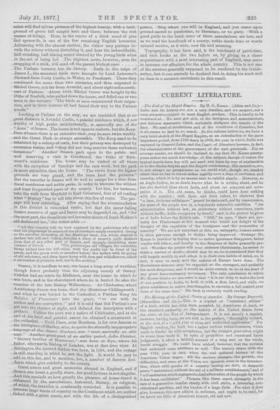CURRENT LITERATURE.
The Pall of the Mogul Empire, By II. G. Keene. (Allen and Co.)— India and its history are not a very familiar, and we suspect, not a very attractive ,subjeet to most English readers. This is hardly to be wondered at. We soon got sick of the. intrig,uos, and assassinations, and hideous massacres which uniformly disfigure the annals of Abe East. We read of revolutions and of the overthrow of dynasties, but it all seems to lead to no result. In the volume before us, we have a very brief,sketelt of the Mogul Empire, as an introduction to the snore important period, from 1760 down to 1803, the year in which Delhi was captured by General Lake, and the Court of Directors became, in fact, the administrators of the government of the vast peninsula. For an average reader, we should . be .inelined to say that Mr. Keene presup- poses rather too much knowledge of the subject, though of course the typical fourth-form boy will not need any hints by way of explanation as to the Barlia.Saiyide and the Rajput confederacy. His narrative, WO; is not always as perspicuous as we eould wish, though we frankly admit that he has to travel rather rapidly over a time of confusion and anarchy, which it is by no means easy to exhibit clearly. However, as an Anglo-Indian, ho no -doubt knows what he is writing about, and he has also decided ideas about India, and about our conquest and occu- pation of it. The old races, he thinks, could have dono nothing with the country; with them and their rulers, ho observes that " a base, tortuous selfishness " passed forstatocraft, and by consequence, the mass of the people was in a hopelessly miserable condition. "An administration without law, an aristocracy without conscience, roads without traffic, fields overgrown by forest," such is the picture he.gives us of India before the British stile. "Still," he says, "there are, pro- bably few Hindostanis at this moment who would not delight in the thought of the expulsion of the foreigners and the restoration of anarchy." We are not surprised at this, as, unhappily, human, nature is often perverse enough to dislike being improved. Perhaps Mr. Keene is justified in hoping that as native ignorance disappears, better results will follow, and loyalty to the Empress of India generally pre- vail. Whether the people will -ever embrace Christianity, le-seems to think a matter of doubt; should they do so, he is convinced that they will largely. modify it, and adapt it to their own habits of mind, as, in fact, it may be truly said the nations of Europe have done. The Mussulman element may be regarded. as the strongest, and probably the most -dangerous, and it would be quite certain to be at the head of any great insurrectionary movement. The only conclusion to which Mr. Keene thinks we can come is that "it is our duty to make the best of our position in India, to hold it with a -firm hand, and while we place confidence in native functionaries, to exercise a full control over them at the same thus." His hook is certainly worth reading.






























 Previous page
Previous page